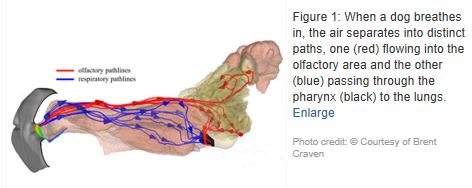A Dog's Excellent Sense of Smell

Dogs have an excellent sense of smell for a number of reasons:
A dog’s nose has up to 300 million olfactory receptors (the text says 220 million, but other research has shown that they have anywhere from 125 million to 300 million, depending on the breed) compared with a human’s 5 million.
Approx 30% of a dog’s brain is dedicated to analysing odour (40 times larger than with a human). So although a dog’s brain is only one-tenth the size of a human brain, a dog’s sense of smell is about 1,000 to 10,000,000 times more sensitive than a human’s (depending on the breed).
Dogs have mobile nostrils, which help to determine the direction of the scent.
The olfactory system is linked directly to memory and emotion in the brain.
The mucus on a dog’s nose actually helps it to smell by capturing scent particles. When a dog’s nose is dry they may lick it to aid them in scent.
When dogs inhale, a fold of tissue just inside their nostril helps to separate the two functions of breathing and smelling – this tissue splits the air into two different flow paths, one for olfaction and one for respiration.
When dogs exhale, the spent air exits through the slits in the side of their nose – this causes the exhaled air to swirl out and helps usher new odours into the dog’s nose, and it also allows dogs to sniff more or less continuously. In a study, a dog was able to sniff in a continuous stream of air for up to 40 seconds, spanning at least 30 respiratory cycles.
Dogs have a second olfactory capability that humans don’t have, made possible by an organ called the vomeronasal organ (also known as Jacobson’s organ). This is located in the bottom of a dog’s nasal passage and picks up pheromones. These pheromones are found in the urine and faecal of animals, but also on the skin and the fur, and are chemicals that are unique to each animal species and which advertise mating readiness and other sex-related details. They can also give information on the animal’s mood and what they have eaten or touched.
NB when a dog is overheated and actively panting, its sense of smell is reduced by as much as 40% as it uses the air to cool itself rather than for smelling.
